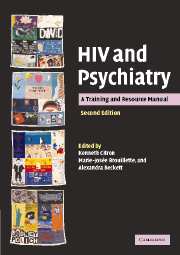Book contents
- Frontmatter
- Contents
- List of contributors
- Preface
- 1 Medical overview
- 2 Cognitive disorders in people living with HIV disease
- 3 General principles of pharmacotherapy for the patient with HIV infection
- 4 Mood disorders and psychosis in HIV
- 5 Suicidal behavior and HIV infection
- 6 Anxiety disorders and HIV disease
- 7 General issues in hospital HIV psychiatry
- 8 HIV and people with serious and persistent mental illness
- 9 Psychotherapy
- 10 HIV and substance use disorders
- 11 Psychiatric issues in pediatric HIV/AIDS
- 12 Uninfected children of parents with HIV
- 13 Psychological issues faced by gay men
- 14 Women and HIV
- 15 Couples
- 16A HIV and cultural diversity
- 16B African Americans
- 16C Latinos and HIV disease
- 16D One heart, two spirit, and beyond: HIV and the people of the First Nations
- 17 HIV in prison populations
- 18 Legal and ethical issues
- 19 Psychiatrist as caregiver
- Appendix I HIV Counselling checklist for physicians
- Index
Appendix I - HIV Counselling checklist for physicians
Published online by Cambridge University Press: 06 August 2009
- Frontmatter
- Contents
- List of contributors
- Preface
- 1 Medical overview
- 2 Cognitive disorders in people living with HIV disease
- 3 General principles of pharmacotherapy for the patient with HIV infection
- 4 Mood disorders and psychosis in HIV
- 5 Suicidal behavior and HIV infection
- 6 Anxiety disorders and HIV disease
- 7 General issues in hospital HIV psychiatry
- 8 HIV and people with serious and persistent mental illness
- 9 Psychotherapy
- 10 HIV and substance use disorders
- 11 Psychiatric issues in pediatric HIV/AIDS
- 12 Uninfected children of parents with HIV
- 13 Psychological issues faced by gay men
- 14 Women and HIV
- 15 Couples
- 16A HIV and cultural diversity
- 16B African Americans
- 16C Latinos and HIV disease
- 16D One heart, two spirit, and beyond: HIV and the people of the First Nations
- 17 HIV in prison populations
- 18 Legal and ethical issues
- 19 Psychiatrist as caregiver
- Appendix I HIV Counselling checklist for physicians
- Index
Summary
Pretest counseling
A person's for HIV testing should be honored.
Explore risk history and discuss reasons for the test.
Assess the person's risk of having been exposed to or of being infected with HIV.
Provide information about HIV infection and testing, including the meaning of positive, negative, and indeterminate test results, and the impact of the window period. Discuss risk reduction and explore specific ways in which the person can avoid or reduce risk-producing behavior.
Identify testing options available in the region, specifically nominal, non-nominal and anonymous testing.
Discuss the potential benefits and harms of being tested and of being found HIV-positive.
Discuss the confidentiality of test results in relation to office or clinical procedures, communicating results to other healthcare officials, provincial reporting requirements and partner notification.
Discuss the stress related to waiting for test results and possible reactions to learning the results.
Assess the window period by identifying the most recent risk event and plan an appropriate time for testing. Obtain and record informed consent, whether provided in writing or verbally, before testing is conducted.
Arrange a return appointment after a predetermined interval for a face-to-face visit to inform the patient of his or her test results.
A person has the right to decline testing.
Post-test counseling
HIV test results are given only in person.
Assess the patient's understanding of the test result.
Encourage the patient to express feelings and reactions.
Negative and indeterminate result
Discuss any need for repeat testing.
Review the ways in which HIV is transmitted.
[…]
- Type
- Chapter
- Information
- HIV and PsychiatryTraining and Resource Manual, pp. 319 - 320Publisher: Cambridge University PressPrint publication year: 2005



